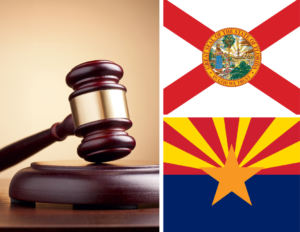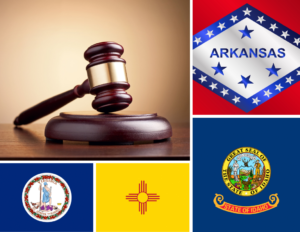2 States with Potential New Economic Nexus Legislation

Last week we looked at states with new economic nexus legislation pending after the Wayfair Supreme Court ruling this past summer.
Today we’ll look at companies with pending online sales tax provisions. We’ll be keeping an eye on them in the coming months.
Florida’s Senate Bill 1112 for Online Sales Tax
Quick Florida highlights:
- Passed? Not yet, it’s still in legislation
- Effective date? If it passes, July 1, 2019
- Thresholds? 200 separate transactions or sales exceeding $100,000
- Anything else? Marketplace facilitators need to collect and remit online sales tax on behalf of sellers
Florida’s legislature is considering Senate Bill 1112, which would potentially go into effect July 1, 2019. Under this bill, a company would establish economic nexus in Florida if at least one of these thresholds are met:
- 200 or more separate retail sales of tangible personal property or taxable services
- Any number of retail sales of tangible personal property or taxable services in an amount more than $100,000
Senate Bill 1112 would also mandate that marketplace facilitators need to collect and remit online sales tax on transactions on behalf of third-party sellers. This would apply to those selling to consumers through programs like Fulfillment by Amazon.
4 States with New Economic Nexus Legislation

Following last year’s Wayfair Supreme Court case, which set precedent for states to enact economic nexus provisions, legislatures across the country have defined and implemented new online sales tax laws.
Although many states quickly implemented economic nexus provisions and have already started collecting online sales tax, there are some that have decided to take a little bit of extra time.
Arkansas’ Online Sales Tax Legislation
Here are four states that recently passed online sales tax provisions. Keep reading for the details!
Quick Arkansas highlights:
- Passed? Yes
- Effective date? July 1, 2019
- Thresholds? 200 separate transactions or sales exceeding $100,000 of tangible personal property, taxable services, digital codes or specified digital products
With very similar to the wording in South Dakota’s SB 106 (the law that went before the U.S. Supreme Court in the Wayfair case), Arkansas’ online sales tax legislation establishes economic nexus on companies with at least 200 transactions or more than $100,000 in sales. Relevant purchases include tangible personal property, taxable services, digital codes or specified digital products.
Focus on Minnesota

Minnesota is a state in the Upper Midwest and northern
regions of the United States. Minnesota is the 12th largest state in
area and the 22nd most populous state, where 60% of its residents
live in the Minneapolis-Saint Paul metropolitan area (known as the “Twin
Cities”). This area is the center of transportation, business, industry,
education, and government, while being home to an internationally known arts
community. The remainder of the state consists of western prairies now given
over to intensive agriculture; deciduous forests in the southeast, now
partially cleared, farmed, and settled; and the less populated North Woods,
used for mining, forestry and recreation.
State Tax Credits & Incentives in the News: How Much Focus is Too Much?

It’s no secret that lawmakers use legislation like state tax credits to implement change, such as standardizing the legal drinking age or attracting new business to their state. Most of the time, credits and incentives DO cater to specific industries or desired activities, like increasing employment or attracting corporate headquarters to states. But do legislators ever take this method of wielding influence too far?
I’ve included two interesting examples in the news I recently found and included my thoughts; let me know if you agree!
Washington: Microsoft Requests More State Tax
In Washington state, Microsoft is asking the legislature to increase state tax collected from tech companies in an effort to increase funds dedicated to workforce education. The request includes a provision that specifically targets two companies that make more than $100 billion in annual revenue: Microsoft itself and Amazon.
Wayfair and California- Yes, Indeed!
Breaking news: Assembly Bill 147 has been passed by the CA state legislature and signed by the Governor on April 25, 2019, that eliminates the transaction threshold and raises the sales threshold from $100,000 to $500,000. For more information on this new legislation, click here to view our latest blog.

It’s been over 9 months since the U.S. Supreme Court handed down its landmark decision in South Dakota v. Wayfair Inc., which made it easier for states to enact nexus triggering legislation, leading ultimately to the collection of sales tax revenue from companies doing business in the state.
The Supreme Court’s ruling in June 2018 did not automatically make economic nexus the law of the land for all 50 states. The high court’s decision was that South Dakota’s economic nexus law was constitutional. Since this ruling, states have been jumping on the economic nexus bandwagon by enacting similar legislation. As we describe in a recent blog, economic nexus is based upon the amount of sales or number of transactions in the state. If a certain threshold is met, nexus is deemed to be created. For instance in South Dakota, economic nexus is created in if an out of state company makes sales of products or services into South Dakota in excess of $100,000 or has 200 or more transactions.
Happy Anniversary! And A Quick Look Back at This Year's Big Changes

A very happy anniversary to Miles Consulting Group! It’s hard to believe we’re already celebrating our 17th year in business. As you can imagine, we’ve seen a lot of legislative changes come and go in that time, but the past year specifically has held quite a few noteworthy milestones, especially in the online sales tax debate.
The Online Sales Tax Debate Goes to the Supreme Court
This past June, the Supreme Court ruled on Wayfair, setting precedent for states to define economic nexus and online sales tax legislation for purchases made online. It’s amazing how almost every state has enacted some kind of economic nexus statute since last June, and it’s the first time in 17 years we’ve seen this many states come together to agree on something!
FOCUS ON OREGON

Oregon, also known as the Beaver state, is located in the
Pacific Northwest region of the West coast of the United States. The Columbia
River delineates much of Oregon’s northern boundary with Washington, while the
Snake River delineates much of its eastern boundary with Idaho. Oregon is one
of only three states of the contiguous United States to have a coastline on the
Pacific Ocean.
Oregon is one of the most geographically diverse states in
the U.S., marked by volcanoes, abundant bodies of water, dense evergreen and
mixed forests, as well as high deserts and semi-arid shrublands. At 11,249
feet, Mount Hood, a volcano, is the state’s highest point. Oregon’s only
national Park, Crater Lake National Park, comprises the caldera surrounding
Crater Lake, the deepest lake in the United States. The state is also home to
the single largest organism in the world Armillaria ostoyae, a fungus that runs
beneath 2,200 acres of the Malheur National Forest.
What You Need to Know: States' Online Sales Tax & Marketplace Facilitators

Across the country, states continue to update their sales tax laws in an effort to clarify provisions and increase state income. Of course, because company sales extend beyond state borders, it’s extremely important for your business to be aware of various multi-state tax issues and how they may affect your organization.
One major trend we’re seeing (unsurprisingly) is more states’ adoption of economic nexus and online sales tax provisions based on the Wayfair Supreme Court case. In addition, states that had adopted marketplace facilitators as part of their tax code are beginning to clarify their new role. What does this mean? Keep reading for the details!
Marketplace Facilitators & Their Role in State Sales Tax
As this blog post explains, marketplace facilitators are companies that facilitate:
- A seller’s product and payment
- The transaction between a buyer and seller by bringing them together
- The transaction by processing payment, storing inventory, listing products, setting prices, etc.
Amazon and eBay are two prominent companies that are often designated as marketplace facilitators.
Before the Wayfair case, some states like Washington were using these marketplace facilitators to collect and remit sales tax on sellers’ behalf, or provide notice and reporting to help the state collect its taxes.
IT'S STILL ALL GREEK- U.S. MULTISTATE TAX FOR FOREIGN COMPANIES SINCE WAYFAIR

Almost two years ago (my how time flies), my husband and I took an amazing vacation on a cruise of the Mediterranean. When I returned from that trip, I wrote a blog about the nuances for foreign companies doing business in the United States as it relates to state tax issues. Income tax and sales tax in the US are challenging concepts not only for foreign companies, but also domestic companies. And as the state tax landscape has changed recently as a result of the recent South Dakota v. Wayfair (2018) decision, it may also be impacting foreign companies doing business here as well.
So, to recap
from that prior blog article, and to elaborate a bit further, here are some of
the major areas for foreign companies to consider as they begin doing business
in the US.
The Truth About SaaS & Economic Nexus: 5 Myths Exposed

There are a lot of misconceptions when it comes to SaaS and economic nexus, especially following last year’s Wayfair decision. Although these technology companies generally aren’t selling a tangible product across state lines, many state online sales tax laws are written in a way that make these businesses liable for collecting and remitting state sales tax.
Are you unknowingly exposing your SaaS company to sales tax risk by creating economic nexus? Keep reading for the truth about five common myths!
Myth #1: Because Wayfair online sales tax statutes provide for a clear date to begin filing, we don’t need to worry about retroactive exposure.
While it’s true that most states are not requiring companies to go back and file retroactively based upon the new economic nexus provisions (certain dollar or transactional thresholds of sales into a state during a year), there is still some retroactivity that companies may be forgetting.




















